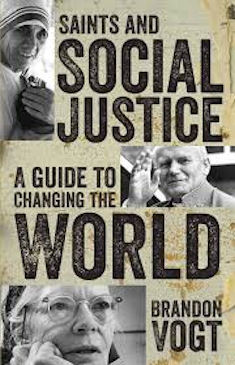
|
Posted December 5, 2014
Book: Saints and Social Justice: A Guide to Changing the World Author: Brandon Vogt Our Sunday Visitor, Huntington, IN. 2014. Pp. 160 An Excerpt from the Jacket:
The value of human life. The call to family and community. Serving the poor. The rights of workers. Care for creation. The Church has always taught certain undeniable truths that can and should affect our society. But over the years, these teachings have been distorted, misunderstood, and forgotten. With the help of fourteen saints, it's time we reclaim Catholic social teaching and rediscover it through the lives of those who best lived it out. Follow in the saints' footsteps, learn from their example, and become the spark of authentic social justice that sets the world on fire. An Excerpt from the Book: Lessons from St. Thomas More The tremendous example of St. Thomas More offers several lessons about rights and responsibilities. First, he reminds us that we're all responsible for upholding the rights of others. When it comes to rights and duties, today's world usually gets one side of the equation right. We strongly emphasize our own rights, demanding the right to do what we want, say what we want, and live where we want. And none of this is inherently bad, for to an extent, Catholic social teaching would agree. The Church maintains a long list of basic rights that all people deserve to claim. Yet along with those rights we have corresponding responsibilities. These duties root themselves in our common brotherhood, the fact that we're all created by the same God and are members of the same eternal family. This means we're responsible for helping each other flourish. Thomas knew this well, and it explains why he consistently submitted his own wants to the needs of others: to the material needs of the poor, to the legal needs of the oppressed, and to the demands of truth and conscience. For every right we have, we have the duty to protect that right in others. Second, Thomas shows us that accepting these duties can often lead to discomfort. Thomas was no fool. He knew that refusing to sign the oath honoring the king's Act of Succession would likely end in death. He sensed that family and friends would not understand, and that standing for the truth would cost his job, his home, and probably his life. But he also knew it was the right thing to do. He prayed near the end of his life: "Give me, good Lord, a longing to be with you: not for the avoiding of the calamities of this wicked world, nor of the pains of hell."`` Table of Contents: Life and Dignity of the Human Person 1. Bl. Teresa of Calcutta 2. St. Peter Claver Call to Family, Community and Participation 3. St. Frances of Rome 4. Bl. Anne Marie Javouhey Rights and Responsibilities 5. St. Roque Gonzalez 6. St. Thomas More Option for the Poor and Vulnerable 7. Bl. Pier Giorgio Frassati 8. St. Vincent de Paul The Dignity of Work and the Rights of Workers 9. St. Benedict of Nursia 10. Servant of God Dorothy Day Solidarity 11. St. John Paul II 12. St. Damien of Molokai Care for Creation 13. St. Giles 14. St. Isidore the Farmer |
|
